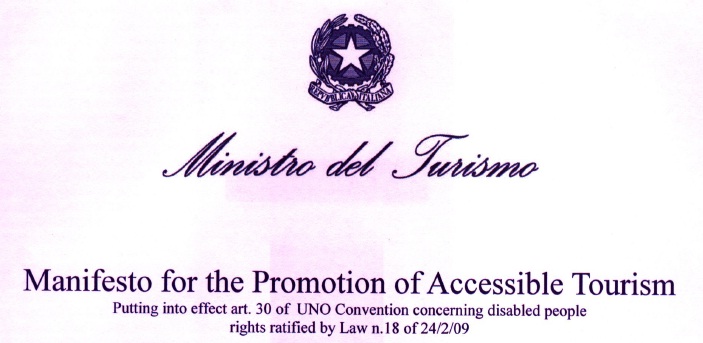ENAT Supports Italian "Manifesto for the Promotion of Accessible Tourism"
Share on social media
Showing its commitment to put into effect Article 30 of the UN Convention on the Rights of Persons with Disabilities, the Italian Ministry of Tourism has created a Manifesto promoting Accessible Tourism. ENAT is the first international NGO to support the manifesto.
 Image: Title header of the Italian Manifesto
Image: Title header of the Italian Manifesto
Showing its commitment to put into effect Article 30 of the UN Convention on the Rights of Persons with Disabilities, the Italian Ministry of Tourism has created a Manifesto promoting Accessible Tourism.
ENAT is the first international NGO to support the Manifesto.
ENAT Board Member, Dr. Angelika Laburda signed the Manifesto on behalf of ENAT at the Gitando 2011 Feira da Vicenza trade fair on 25th March 2011, in the presence of the Italian Minister of Tourism, Michela Vittoria Brambilla.
 Dr. Angelika Laburda, ENAT Board Member
Dr. Angelika Laburda, ENAT Board Member
"On behalf of ENAT, I would like to state our support for the Italian Ministry's Manifesto on Accessible Tourism ", said Dr. Laburda.
"This document raises awareness of the importance of providing accessibility for all tourists. And, at the same time, it points out the responsibilities which public authorities, educators and tourism providers have for fulfilling Italy's commitments to international and national objectives. The Manifesto shows that Italy is willing to show leadership and commitment - and other countries will hopefully follow your good example".
Chairman of the Italian Agency for Tourism (ENIT), Matteo Marzotto added: "Accessibility means lack of architectural, cultural and sensory barriers - a fundamental condition to allow the holiday's full effect - and it relates to people with particular needs, not only regarding movement but also chronic health issues (people with food and environment allergies, the blind, the deaf or mentally disabled people, small children and the elderly, etc.). The involvement of all these visitors and their families in tourism has a great numerical as well as psychological, impact".
Following the signing in Vicenza, in May 2011, the new Italian National Tourism Code (Decree 79 of 5/23/2011) was passed into law, to be in force from 21 June, where in the Article 3 the principles of Accessible Tourism are included (see Article 1 of the Manifesto, below). This marks a major step forward in the Italian legislation on Accessible Tourism.
The Minister of Tourism, Michela Vittoria Brambilla, who co-signed the Manifesto with Dr. Laburda, is Chair of the Executive Council Board of the UN World Tourism Organisation and in that role in Nairobi in July 2011 has proposed to 154 countries and 400 other WTO member organizations to sign up to the Manifesto. The first interested countries can sign the document already from the next UNWTO meeting which should take place in Cambodia in October.
Download the Italian Ministry of Tourism's Manifesto on Accessible Tourism in PDF format (English and Italian versions) from the right-hand panel.
Manifesto text
Manifesto for the Promotion of Accessible Tourism
Putting into effect art. 30 of UN Convention concerning disabled people
rights ratified by Law n.18 of 24/2/09
1. People in the most complete meaning of the term, with their specific needs resulting from personal and health conditions (for example: motor, sensory, intellectual disabilities, food intolerances, etc.), are citizens and customers who have the right to autonomously make good use of all the tourist services on offer, being supplied with suitable services with a just quality/price ratio.
2. Accessibility involves the whole tourist service chain, both at national and local level, starting with:
a. Transport network;
b. Accommodation capacity;
c. Restaurants and cafés;
d. Culture, leisure and sports.
3. Location accessibility shall not be the decisive factor when planning holidays: it should be possible to choose a destination or a tourist facility because it is where we want to go and not because it is the only accessible one.
4. It is necessary to think of accessibility as access to life experiences, that is overcoming the concept of “standard”, enhancing the value of the person/customer, who has specific needs.
5. Information about accessibility cannot be reduced to a mere symbol, but has to be objective, detailed and guaranteed, to allow each person to certainly evaluate by himself which tourist facilities and services are able to meet his specific needs.
6. It is necessary to promote positive communication, avoiding the use of discriminating words. It has to be distributed in formats that everybody can use, and through all tourist information and promotion channels.
7. As accessibility does not concern only structural and infrastructural aspects, but also the services offered to tourists, it is necessary to promote quality reception for everybody, that is to encourage a cultural change, that can result in changes in organization and management models, even before structural ones.
8. It is necessary to encourage skill and professional training, based on Universal Design principles and involving the whole tourist and technical professional profile chain: managers, employees, companies, public and private enterprises. It is also necessary to update curricula in all Schools for Tourism, Technical Schools, Universities, Masters and Academic Centres of all grades.
9. Local Authorities, according to their competences and functions, shall implement the accessibility of towns, public buildings and local transports, and shall also plan periodical control and promotion operations for tourist offers for everyone.
10. In order to implement and promote accessible tourism in a system logic, proactive collaboration among tourist Operators, Local Authorities, Public Bodies, disabled people Associations and social tourism Organizations is encouraged.
Links to related Italian web articles:
ENIT - Italian National Agency for Tourism, News Item on Accessible Tourism
